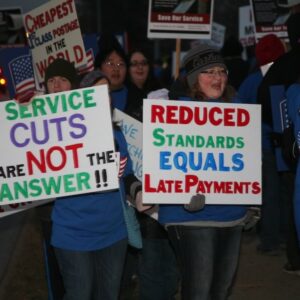July 1, 2015
Transparency is a MUST
(This article first appeared in the July-August 2015 issue of The American Postal Worker magazine.)
After the initial rounds of negotiations, it has become even more apparent why the Motor Vehicle Division must have transparency at all levels regarding the Postal Service’s subcontracting practices.
Beginning in March 2014, the union requested two key figures regarding Vehicle Maintenance Facilities: the estimated rate the USPS uses for MVS employees when making cost comparisons to decide whether to subcontract work and the hourly rate assigned to subcontractors that perform repairs, shuttling, towing, etc. The union also requested an explanation of how management calculates the costs; asked for a breakdown of the different categories, and requested the costs associated with each category.
The USPS responded on Aug. 28, 2014, by stating that the information is based on local fact circumstances and that the costs vary.
The union replied with a reminder that the USPS committed to providing the information in the settlement discussions of a National Labor Relations Board charge. Additionally, we requested the VMF costs for 11 specific sites.
These ‘Costs’ Make No Sense!
To be sure we were acting with due diligence, we sent two mailings to all locals, asking them to request the information from their respective managers.
Overwhelmingly, local managers said the information had to be obtained at the headquarters level. Local managers said they don’t have or don’t know what information our local officers were requesting. Some local managers simply provided a copy of the National Average Labor Rates chart, which omits the labor rates for VMF employees.
The union strenuously disagreed with the assertion that the information must be obtained locally and asked management – for the record – if a dispute exists.
On April 8, 2015, the USPS responded with the hourly rate for the 11 sites we requested. The USPS listed hourly rates as high as $101 and as low as $74. (See chart.)
|
Site |
Estimated Average Hourly Rate |
|
Tampa, FL |
$98.87 |
|
Detroit, MI |
$101.74 |
|
Boston, MA |
$88.12 |
|
St. Paul, MN |
$76.69 |
|
Lakewood, NJ |
$95.98 |
|
San Francisco, CA |
$86.07 |
|
San Diego, CA |
$74.52 |
|
Denver, CO |
$82.77 |
|
Jackson, MS |
$98.88 |
|
Baton Rouge, LA |
$83.71 |
|
San Antonio, TX |
$82.70 |
The union has requested a full explanation of these specific rates; renewed the request for the VMF costs chargeable to others, and asked for an explanation of how management is accounting for bargaining unit costs when considering subcontracting in the VMF.
Arbitrator Sustains Grievance
As you may know, USPS notified the APWU on April 26, 2013, that it was considering subcontracting the highway movement of mail in approximately 162 PVS sites nationwide.
The reason for doing so, according to the manager of Surface Transportation Operations, was that the Postal Service was in a difficult financial situation and management was trying to cut $1 billion from the Surface Transportation Operations budget.
The irony is that the parties had recently bargained for the opposite – during negotiations for the 2010-2015 contract. The intent of those negotiations was to ensure the longevity of PVS and the growth of the craft. The MVS Jobs Memorandum of Understanding (MOU) stated the employer would:
- Fill 740 duties assigned with Motor Vehicle Craft employees in VMFs;
- Have MVS assume service on a minimum of 600 PVS routes currently contracted to HCRs;
- Audit EAS jobs to return administrative and technical duties from EAS positions to bargaining unit, and
- Provide at least 60 additional administrative and technical duty assignments to the MVS Craft.
Management made these commitments more than four years ago, but has yet to fulfill them.
On March 25, 2015, Arbitrator Stephen B. Goldberg sustained the union’s grievance and ruled that the USPS could not partake in any subcontracting at this time. His award summary states:
- The Postal Service may not contract out PVS work that would have a significant effect on the bargaining unit without first complying with the MOU.
- The Postal Service may not engage in the Article 32.1.B. consideration of contracting out PVS work that would have a significant impact on the bargaining unit without first complying with the MVS Jobs MOU.
- The Postal Service violated Article 32.1.B and the MOU on Consideration of National Outsourcing Initiatives by failing to comply with procedural requirements when considering contracting out the PVS function.
Notable evidence in the case included continuous requests by the APWU for clarity on the Postal Service’s subcontracting initiatives, from the development of the initial comparative report to the union’s requests for information and meetings.
Although the ruling by Arbitrator Goldberg is very significant and will slow the Postal Service’s attempts to subcontract our work, it will not stop it. We must continue to aggressively seek transparency regarding subcontracting at all levels and fight to protect our work and craft.
The union has also initiated two national disputes regarding these issues:
- Service-wide costs, Case #HQTV- 20140511, on the inflated hourly employment costs when management compares the cost of using craft employees to the cost of using contractors to perform bargaining unit work. This violates Article 32 of the Collective Bargaining Agreement and the parties’ MOU requiring a fair comparison of all reasonable costs when contracted costs are compared to in-house costs.
- VMF Labor Cost Per Hour Rate, Case #HQTV20150041, on the USPS practice of arbitrarily and capriciously shifting the Vehicle Maintenance Labor Cost Per Hour Rate from a national hourly average to a local, case-by-case rate. As stated in previous correspondence to the USPS, this is contrary to the Postal Service’s past practice and historical position for calculating VMF labor costs.
During this round of negotiations, MVS Craft officers have kept in mind that management failed to abide by previous promises to grow the craft and ensure the craft’s longevity. We’ve also kept in mind that, although the parties may not always agree on the necessity of subcontracting, there are contractual obligations that must be met before the USPS may subcontract our work. Clear rules governing those practices would benefit both parties.
The APWU is aggressively seeking transparency in subcontracting and we are committed to gaining greater clarity in the new Collective Bargaining Agreement.



